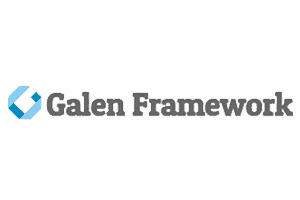What is Galen Framework Used for and How Does it Work?
Galen Framework is a powerful and versatile browser automation tool that is invaluable for web developers and quality assurance professionals. It is specifically designed to facilitate the testing of responsive web designs and ensure that web applications look and function as intended on various devices and screen sizes. Galen Framework accomplishes this through a combination of layout testing and cross-browser compatibility checks.
Key Features of Galen Framework:
-
Layout Testing: Galen Framework allows you to define detailed layout specifications for your web pages. You can specify how elements should be positioned and sized relative to each other, creating a visual representation of your design expectations.
-
Cross-Browser Testing: Galen Framework supports testing across multiple browsers, including Chrome, Firefox, Safari, and Internet Explorer. This ensures that your web application functions consistently across different browser environments.
-
Responsive Testing: With Galen Framework, you can easily verify that your web design adapts correctly to various screen sizes, such as desktop, tablet, and mobile. It helps identify issues like misaligned elements or overlapping content.
-
Parallel Testing: Galen Framework allows for parallel execution of tests, which accelerates the testing process, making it suitable for large-scale projects.
Why Do You Need a Proxy for Galen Framework?
Proxy servers play a crucial role in enhancing the capabilities and effectiveness of Galen Framework. Here’s why you might need a proxy when using this automation tool:
1. Geolocation Testing:
- Scenario: You want to test how your web application behaves for users in different geographic locations.
- Solution: Proxies enable you to simulate users from various regions by routing your requests through proxy servers located in those areas. This is essential for testing geolocation-specific content and services.
2. IP Rotation for Load Testing:
- Scenario: You need to perform load testing on your web application without overwhelming your server’s IP address.
- Solution: Proxies allow you to distribute traffic across multiple IP addresses. This prevents IP-based rate limiting or blocking, ensuring accurate load testing results.
3. Bypassing IP Restrictions:
- Scenario: Your web application imposes restrictions or bans based on IP addresses.
- Solution: Proxies can help you bypass these restrictions by using different IP addresses for your requests. This ensures uninterrupted testing even in cases of IP blocking.
Advantages of Using a Proxy with Galen Framework:
Using proxy servers in conjunction with Galen Framework offers several advantages:
1. Anonymity and Privacy:
- Proxies mask your real IP address, ensuring your testing activities remain confidential.
2. Geolocation Flexibility:
- Proxies enable you to test your web application’s response to users from different regions without physically being there.
3. Enhanced Security:
- Proxies act as intermediaries, adding an extra layer of security between your testing environment and the target web application.
4. Scalability:
- Proxies allow you to distribute traffic across multiple IP addresses, making it easier to scale your testing efforts.
5. Load Balancing:
- Proxies help distribute traffic evenly, preventing server overload during testing.
What Are the Cons of Using Free Proxies for Galen Framework?
While free proxies may seem appealing, they come with certain drawbacks:
| Cons | Description |
|---|---|
| Limited Performance | Free proxies often have limited bandwidth and may slow down your testing process. |
| Unreliable Availability | Free proxies can be unreliable, with frequent downtimes or IP address changes. |
| Security Risks | Some free proxies may be insecure or even malicious, potentially compromising your data. |
| Limited Geolocation | Free proxies may have a limited number of geolocation options, restricting testing diversity. |
What Are the Best Proxies for Galen Framework?
Choosing the right proxy for Galen Framework is crucial for optimal testing. Consider these factors when selecting a proxy service:
| Criteria | Description |
|---|---|
| Reliability | Look for a proxy service with high uptime and minimal IP address changes. |
| Speed | Opt for proxies that offer fast and consistent connection speeds to avoid delays in testing. |
| Geolocation Options | Choose a proxy service that provides a wide range of geolocation options for diverse testing. |
| Security | Ensure the proxy service offers encryption and security features to protect your data. |
| Scalability | Select a service that allows you to easily scale your proxy usage as your testing needs grow. |
How to Configure a Proxy Server for Galen Framework?
Configuring a proxy server for Galen Framework is a straightforward process:
-
Choose a Proxy Service: Select a reliable proxy service that meets your requirements.
-
Obtain Proxy IP and Port: Once you subscribe to a proxy service, you will receive the proxy server’s IP address and port number.
-
Configure Galen Configuration File: In your Galen Framework configuration file, specify the proxy server’s IP and port under the appropriate settings.
-
Authentication (if required): If your proxy service requires authentication, provide the username and password in the configuration file.
-
Run Tests: With the proxy configured, you can now execute your Galen Framework tests, and all requests will be routed through the proxy server.
In conclusion, Galen Framework is a robust tool for web design and cross-browser testing, and when used in conjunction with the right proxy server, it becomes even more powerful. Proxies enhance testing capabilities by enabling geolocation testing, load balancing, and ensuring anonymity and security. However, it’s essential to choose a reliable proxy service that aligns with your specific testing needs to fully leverage the benefits of Galen Framework.













